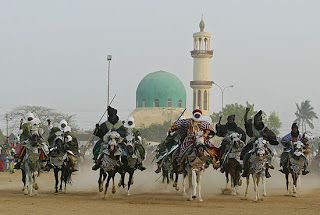1: Durbar:
Durbar is a hundreds year old festival, dating back to the time of festival dates back when horses were used in warfare. During this festival, each town, district, and nobility house
 hold contributes a regiment to the defense of the state. Once or twice a year, state�s military chiefs invite different regiments for a Durbar (military parade) for the chiefs and his is companions. During the parade, the regiments showcase their horsemanship, their preparedness for war, and their loyalty to the state. Today, Durbar has become a festival celebrated in honor of visiting the Heads of State and at the culmination of the two great Muslim festivals, Eid-al Fitri & Eid-al Kabir. The festival begins with each group racing across the square at full gallop, swords glinting in the sun. They pass just few feet away from the Cheif, and then stop suddenly to salute him with raised swords.
hold contributes a regiment to the defense of the state. Once or twice a year, state�s military chiefs invite different regiments for a Durbar (military parade) for the chiefs and his is companions. During the parade, the regiments showcase their horsemanship, their preparedness for war, and their loyalty to the state. Today, Durbar has become a festival celebrated in honor of visiting the Heads of State and at the culmination of the two great Muslim festivals, Eid-al Fitri & Eid-al Kabir. The festival begins with each group racing across the square at full gallop, swords glinting in the sun. They pass just few feet away from the Cheif, and then stop suddenly to salute him with raised swords.2: Arugungu Fishing Festival:

The annual festival of Arugungu takes place in Arugungu a riverside town in Kebbi State. It is the leading tourist attraction in the area. The festival originated in august 1934, when the late Sultan Dan Mu�azu made an historic visit to Arugungu and in his honour a grand fishing festival was organized. Since then, it has become a yearly event held between the months of February & March. During the festival, hundreds of local men and boys enter the water, armed with large fishnet scoops. The festival also marks the end of the growing season and the harvest. A one mile (1.6 kilometer) stretch of the Argungu River is protected throughout the year, so that the fish will be plentiful for this 45-minute fishing frenzy. The festival also includes many other events, such as canoe races and diving competition.
3: Sharo/Shadi Festival :
The Sharo or Shadi festival (flogging meeting) is part if Fulani culture involving age-old initiations. During the Sharo festival, bare-chested contestants, usually unmarried men, come to the center ring, escorted by beautiful girls. A challenger, also bare-chested, comes out brandishing a whip, trying to frighten his opponent. The festival proceeds with lively drumming, singing, cheers and self-praises from both competitors and challengers. When the excitement is at a fevered pitch, it is the time for flogging.
4: Eyo Festival:
Eyo Festival is unique festival and is believed to be the prototype of the modern d
 ay carnival in Brazil. During the Eyo festival Day, the main highway in the heart of the city is closed to traffic, allowing for procession from Idumota to Iga Idunganran. The participants pay homage to the Oba of Lagos. Eyo festival takes place whenever occasion and tradition demand, but it is usually held as the final burial rites for a highly regarded chief.
ay carnival in Brazil. During the Eyo festival Day, the main highway in the heart of the city is closed to traffic, allowing for procession from Idumota to Iga Idunganran. The participants pay homage to the Oba of Lagos. Eyo festival takes place whenever occasion and tradition demand, but it is usually held as the final burial rites for a highly regarded chief.5: The Sango:
The Shango festival celebrates the god of thunder, an ancestor who is said to have hanged himself. Lasting about 20 days, sacrifices are made at the shrine of the god, in the compound of the hereditary priest. On the final day, the priest becomes possessed by the god and gains magical powers. He eats fire and swallows gunpowder. The procession again goes off to the Oba's palace and the feast begins, accompanied by palm wine, roast meat, and more dancing.
6: The Benin Festival:

The Benin Festival takes place at the end of the rainy season. It is half a kind of harvest festival but it also serves another purpose of allowing eligible young men and women of the village ritually acquainted to each other. The festival occurs once in every four years and only the very wealthy can afford to have their children take part in the matchmaking ceremony. But all the villagers are able to join in the festival atmosphere.
7: The Ibo Celebration of Onitsha Ivories:
The title of the ivory holder can be claimed by any woman who has collected enough ivory and coral to fit her self out in the costume. Usually, these women are the wives of rich men, or women who have become successful in business and can buy their own ivory. The woman has to have two huge pieces of ivory, one for each leg. The pieces have been known to weigh up to 56 pounds (25 kilos) each. In addition, two large pieces must adorn the wrists.

No comments:
Post a Comment